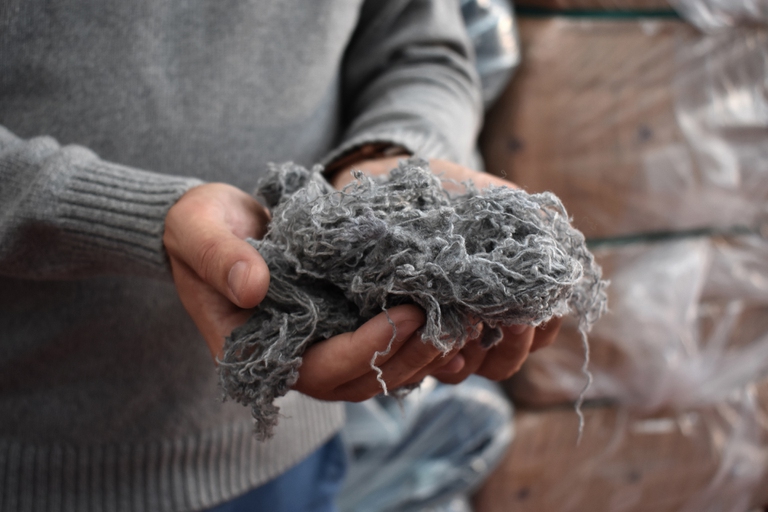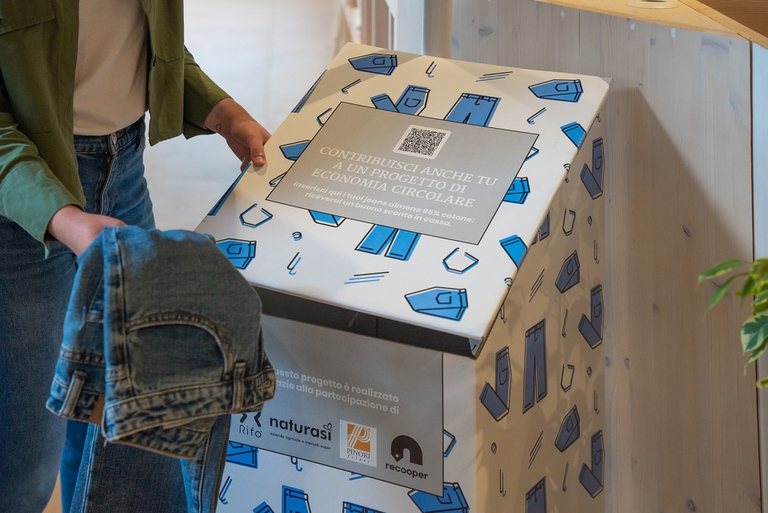https://www.lifegate.it/rifo-jeans-cashmere-rigenerato
- |
She was born in Prato and could not have been born anywhere else Rifo, the startup founded by Niccolò Cipriani that recovers used clothes, ne regenerates the yarn thanks to the wisdom of local artisans and uses it to make new garments.The idea was born from the desire to reduce the consumption of raw materials by recovering valuable materials whose life is far from over, but also to produce in a way that avoid waste and overproduction.In this way Rifò aims to create a more sustainable fashion system, friendly to the environment and the professionals who work there, and which involves consumers by offering them the possibility of disposing of clothes they no longer use.

How Rifò works:zero waste goal
Reducing waste upstream and downstream in your supply chain means many things.Recovering used clothes, in fact, means preventing them from being thrown away or transformed into products of lesser value through recycling.Just think that one denim cotton fiber can be regenerated up to 3 times and one of virgin cashmere even 5 times.Rifò uses the historical skills of the textile sector local and specialized craftsmen, thus building theinnovation on the foundations of tradition.But it is not enough to apply a model circular economy if new waste is then created:this is why Rifò adopts a method of online presales with which it seeks to minimize overproduction, a problem that afflicts the global fashion sector.
A model rooted in the territory
The Rifò production chain is located entirely in Prato textile district that covers a radius of only 30 kilometers and it can be said that it is truly zero km - except for the supply of items to be regenerated which arrive from all over Italy.This allows the startup to reduce fuel consumption and simplify logistics but also to follow the operations on a daily basis and interact with the artisans.Working with the latter also guarantees Rifò agility and flexibility, and the possibility of privileging the small productions, more sustainable.

The Prato textile district it is an area rich in "professions":the first activities in the sector date back to the 1200s and the processing of "rags" is a deep-rooted tradition.Almost 100 years ago, expertise in the regeneration of wood was particularly strengthened wool and of cashmere, valuable materials that maintain their quality for a long time.Over time, new know-how has developed and Rifò has also continued to innovate while remaining in the tradition.As for the jeans regenerated instead, the startup experimented with a yarn developed by a local company and used it to create knitwear products.It's for enhance processes already existing in the district, therefore, that Rifò collections are mainly made of cashmere (or wool) and denim.
The profession of rag-pickers
This supply chain would not be possible without the existence of traditional figures.In fact, at the basis of the upcycling work there are the ragpickers, artisans whose name derives from the Tuscan word cenci which means rags.Rappers sort large quantities of old clothing by hand, sorting them based on quality, material and color.At the same time they check the fabric for imperfections and remove foreign elements such as zippers or seams.The tissues thus selected can be included in the regeneration process without the need to be dyed again, avoiding substantial consumption of water and chemicals.
Although ancient, this is a fundamental profession even today, since it allows you to apply the principles ofcircular economy with the aim of using resources multiple times, maintaining and enhancing their characteristics, creating products with high added value.Furthermore, Rifò allocates part of its revenues to the financing of a school for ragpickers aimed at young people involved in integration programs in the area:a social impact project that combines the themes of training with those of safeguarding the textile tradition.
Not the circular economy is enough, overproduction must be eliminated
To avoid producing more than is necessary and being left with a lot unsold, Rifò puts in online presale its own garments and collects orders in advance so as to produce only what is necessary.This allows the startup to work on small quantities and better monitor production, and the artisans to work according to their own timing and desired quality standards.

The analysis of pre-sales and order data helps Rifò to understand people's tastes and market demands with respect to a new product, so as to propose only the most successful products in the following season.One thing that may seem strange to those who are not used to this approach are the discounts on garments, which are applied before the garments are produced and not when they remain unsold.
For those who want to dispose of their clothes
Everyone can bring their own item of jeans or 100 percent cashmere or wool to one of the collection points in the area, so that it can be regenerated and transformed into a creation from the Rifò collection.Anyone who donates receives a discount voucher to use on the startup's website.In Italy all NaturaSi stores participate in the collection and in Milan also Muji stores.

The regeneration of textile fibers is only possible when the garments are made up of 100 percent (or almost) of a specific material, whether virgin or regenerated.Therefore, choosing when purchasing cotton or wool garments that do not contain significant percentages of synthetic materials also means planning to be able to give a new life to your clothes in the future.

